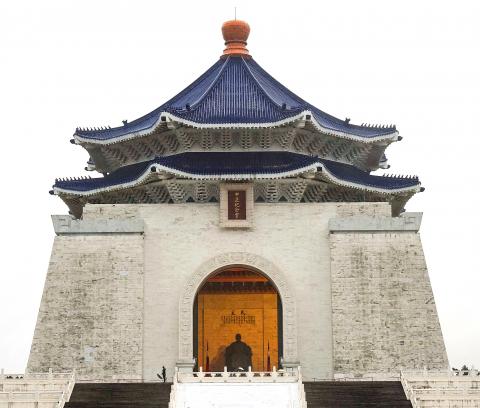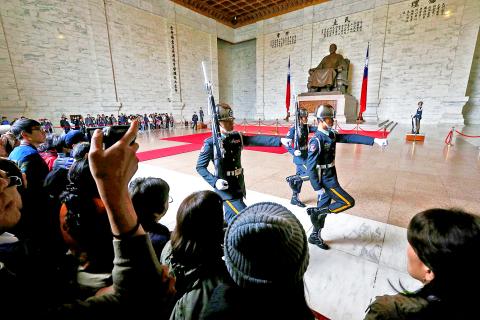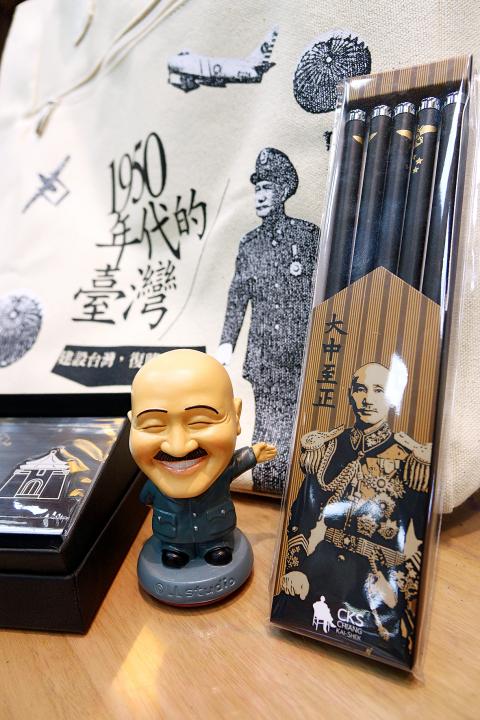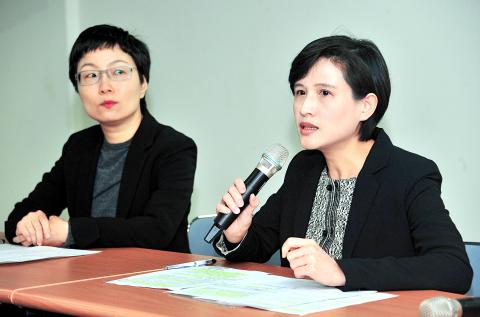The Ministry of Culture yesterday said it is working on a bill to reinvent the Chiang Kai-shek (蔣介石) Memorial Hall, which, if passed, would see the Taipei landmark renamed and most, if not all, of the authoritarian symbols associated with Chiang removed.
“We all know that the Chiang Kai-shek Memorial Hall was built during the nation’s authoritarian era to commemorate a dictator,” Minister of Culture Cheng Li-chiun (鄭麗君) told a Taipei news conference to outline the ministry’s work to promote transitional justice.
“This year marks the 70th anniversary of the 228 Incident and the 30th anniversary of the lifting of martial law. In order to come to terms with history and the damage done, and to pay respect to human rights, we believe that it is necessary to reinvent the Chiang Kai-shek Memorial Hall,” she said.

Photo: Huang Yao-cheng, Taipei Times
The ministry is working on a draft amendment to the Organization Act of National Chiang Kai-shek Memorial Management Office (國立中正紀念堂管理處組織法), which is to be reviewed by the Cabinet and the legislature, she said, adding that the ministry hopes the draft can be passed into law within the next six months, during the upcoming legislative session.
The ministry this month pulled merchandise bearing Chiang’s portraits — including figurines, stationery and accessories — from souvenir stores in the building, Cheng said.
The merchandise can still be bought elsewhere, but it would no longer be manufactured, Cheng said.

Photo: CNA
The ministry has restored the names of exhibition halls and performance venues that were later named after Chiang and his relatives, because the original titles were more generic and thus are not viewed as authoritarian symbols, she said.
For example, the Jie Shi Exhibition Hall, whose title adopted an alternative version of Chiang’s name, was seen yesterday to have regained its original title: “The Second Exhibition Hall.”
Broadcasts of the Chiang Kai-shek Memorial Song — played twice a day as the hall opens and closes — are to be replaced by announcements informing visitors of the facility’s opening hours, Cheng said.

Photo: Chen Yi-chuan, Taipei Times
The ministry this month assembled a panel of experts and academics to assess its plans to repurpose the edifice and gather public opinion on the issue, she said.
In response to media queries over whether the building would be renamed the Taiwan Democracy Memorial Hall, a name proposed by the Ministry of Education in 2007, Cheng said the title is being considered by the ministry, adding that the act must be amended before the building’s name can be officially changed.
She reiterated the necessity of amending the act when asked whether exhibits and artifacts associated with Chiang would be removed from the building, as the act stipulates that work to archive and maintain artifacts related to Chiang be performed by the National Chiang Kai-shek Memorial Hall Management Office.

Photo: Chen Yi-chuan, Taipei Times
Asked whether statues and busts of Chiang would be removed and the daily ceremony of military police changing shifts stopped, Cheng said the issues would be decided after consulting public opinion.
The ministry seeks to transform the building into a facility promoting art and culture, she said.
Northern Taiwan Society chairman Chang Yeh-shen (張葉森) yesterday lauded the ministry’s proposal as “belated justice,” adding that without taking the step of tackling the issues concerning the memorial hall, any talk of implementing transitional justice is worthless.
Additional reporting by Su Fang-ho and Abraham Gerber

SECURITY: As China is ‘reshaping’ Hong Kong’s population, Taiwan must raise the eligibility threshold for applications from Hong Kongers, Chiu Chui-cheng said When Hong Kong and Macau citizens apply for residency in Taiwan, it would be under a new category that includes a “national security observation period,” Mainland Affairs Council (MAC) Minister Chiu Chui-cheng (邱垂正) said yesterday. President William Lai (賴清德) on March 13 announced 17 strategies to counter China’s aggression toward Taiwan, including incorporating national security considerations into the review process for residency applications from Hong Kong and Macau citizens. The situation in Hong Kong is constantly changing, Chiu said to media yesterday on the sidelines of the Taipei Technology Run hosted by the Taipei Neihu Technology Park Development Association. With

CARROT AND STICK: While unrelenting in its military threats, China attracted nearly 40,000 Taiwanese to over 400 business events last year Nearly 40,000 Taiwanese last year joined industry events in China, such as conferences and trade fairs, supported by the Chinese government, a study showed yesterday, as Beijing ramps up a charm offensive toward Taipei alongside military pressure. China has long taken a carrot-and-stick approach to Taiwan, threatening it with the prospect of military action while reaching out to those it believes are amenable to Beijing’s point of view. Taiwanese security officials are wary of what they see as Beijing’s influence campaigns to sway public opinion after Taipei and Beijing gradually resumed travel links halted by the COVID-19 pandemic, but the scale of

A US Marine Corps regiment equipped with Naval Strike Missiles (NSM) is set to participate in the upcoming Balikatan 25 exercise in the Luzon Strait, marking the system’s first-ever deployment in the Philippines. US and Philippine officials have separately confirmed that the Navy Marine Expeditionary Ship Interdiction System (NMESIS) — the mobile launch platform for the Naval Strike Missile — would take part in the joint exercise. The missiles are being deployed to “a strategic first island chain chokepoint” in the waters between Taiwan proper and the Philippines, US-based Naval News reported. “The Luzon Strait and Bashi Channel represent a critical access

Pope Francis is be laid to rest on Saturday after lying in state for three days in St Peter’s Basilica, where the faithful are expected to flock to pay their respects to history’s first Latin American pontiff. The cardinals met yesterday in the Vatican’s synod hall to chart the next steps before a conclave begins to choose Francis’ successor, as condolences poured in from around the world. According to current norms, the conclave must begin between May 5 and 10. The cardinals set the funeral for Saturday at 10am in St Peter’s Square, to be celebrated by the dean of the College